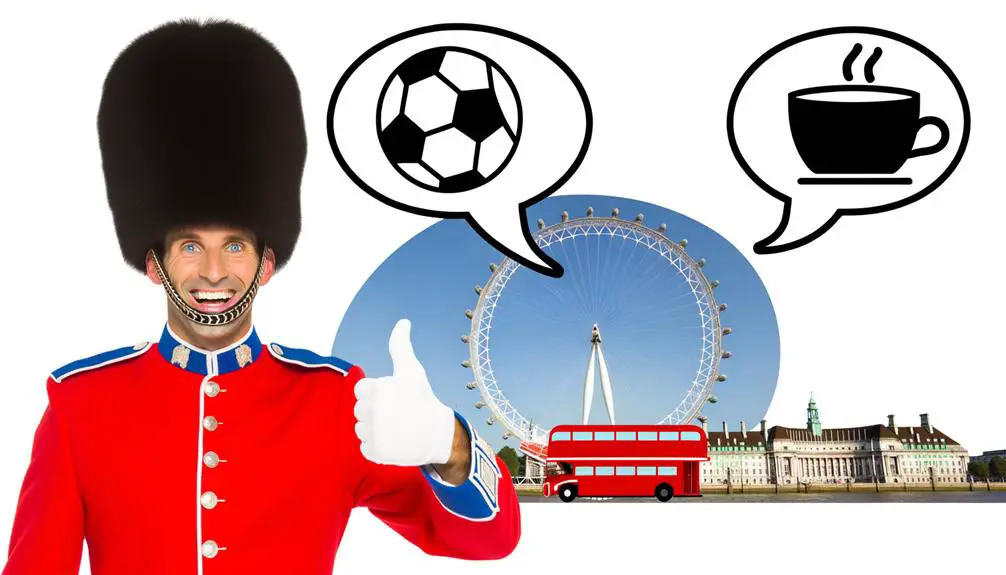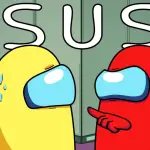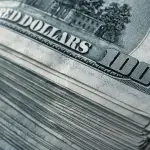In the UK, calling something "brilliant" is your all-access pass to sounding like a local. It's not just smart or shiny; it's the Brit's go-to for expressing a thumbs-up on just about anything. Found a rare sunny day in London? Brilliant. Your mate's new idea? Also brilliant. It's the swiss army knife of compliments, packing a punch of positivity or a sprinkle of sarcasm, depending on the delivery. Whether you're applauding a clever joke, a pint of ale, or the latest footie match, "brilliant" is your word. Stick around, and you'll master the fine art of British approval.
Key Takeaways
- In British slang, 'brilliant' often expresses approval, similar to saying something is excellent or great.
- It can be used to describe anything from a clever idea to exceptional weather, showcasing its versatility.
- 'Brilliant' carries a tone of enthusiasm and positivity, and sometimes sarcasm, depending on context and intonation.
- The word is deeply embedded in British pop culture, used widely across TV shows, music, and by celebrities.
- Understanding the nuance and timing of 'brilliant' is crucial, as it can convey a range of emotions from delight to sarcastic disbelief.
Origins of 'Brilliant' in Slang
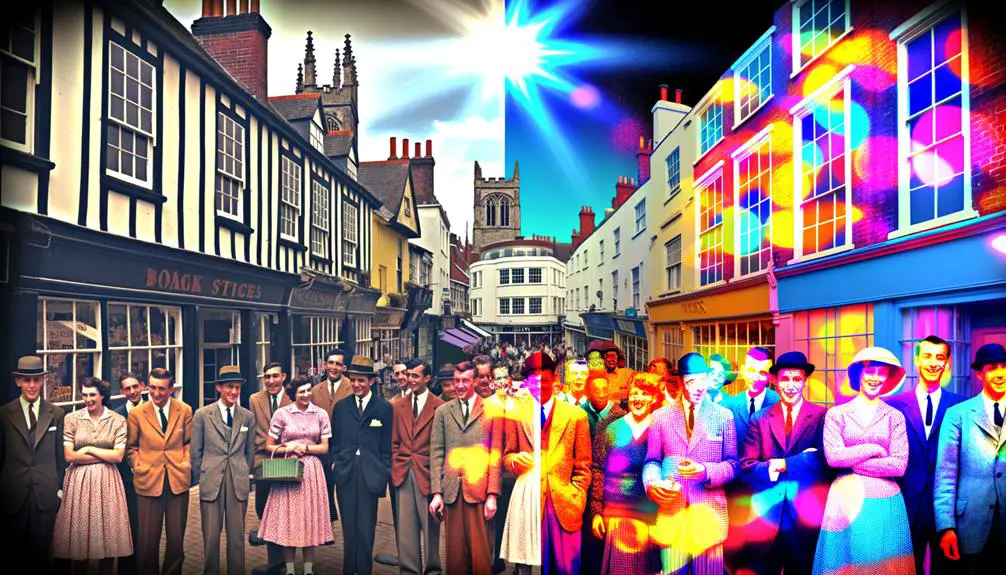
Delving into the origins of 'brilliant' in slang, you'll find it's not just a flash in the pan but a term with deep-rooted cultural vibes across the pond. Your etymology investigation will uncover that 'brilliant' didn't always shimmer in the linguistic landscape as it does today. Initially, it lit up the English lexicon in the 1680s, meaning 'sparkling' or 'shining,' much like a well-cut diamond. But you're not here for a history lesson on gemstones, are you?
As you trace its linguistic evolution, you'll notice a shift. This sparkling descriptor began to illuminate qualities beyond the literal, morphing into a beacon of excellence by the 18th century. Fast forward to the swinging sixties in Britain, and 'brilliant' had taken on new shades, coloring conversations with its glow to mean something outstandingly clever or impressive.
Sift through the layers of British pop culture, and you'll see 'brilliant' embedded in the fabric of linguistic expression, sparkling with versatility and a dash of British wit. It's a proof to the dynamic nature of language, evolving to capture the zeitgeist of its time. So, there you have it, a glimpse into the radiant history of 'brilliant' in slang.
Common Uses in Everyday Conversation
In everyday banter, you'll often hear 'brilliant' tossed around as a casual stamp of approval, whether it's praising a mate's clever joke or celebrating a surprisingly sunny British day. This one word manages to convey a wealth of positivity, enthusiasm, and sometimes, a dash of sarcasm, depending on the tilt of the eyebrow or the smirk that accompanies it.
When it comes to brilliant banter, the Brits are in a league of their own. Dropping a "That's brilliant, mate!" after a friend's witty retort not only acknowledges the cleverness but also adds a layer of camaraderie to the conversation. It's like a verbal high-five, an acknowledgment that yes, you're both geniuses of the social game.
Then there's the brilliant weather – a rare and treasured phenomenon in the UK. When the sun decides to grace the British Isles with its presence, "brilliant" becomes the go-to descriptor. It's not just sunny; it's brilliantly sunny. This isn't merely a comment on the weather but a collective sigh of relief and a reason to celebrate. After all, in a place known for its grey skies, a dash of sunshine is worth its weight in gold.
'Brilliant' in Popular Culture
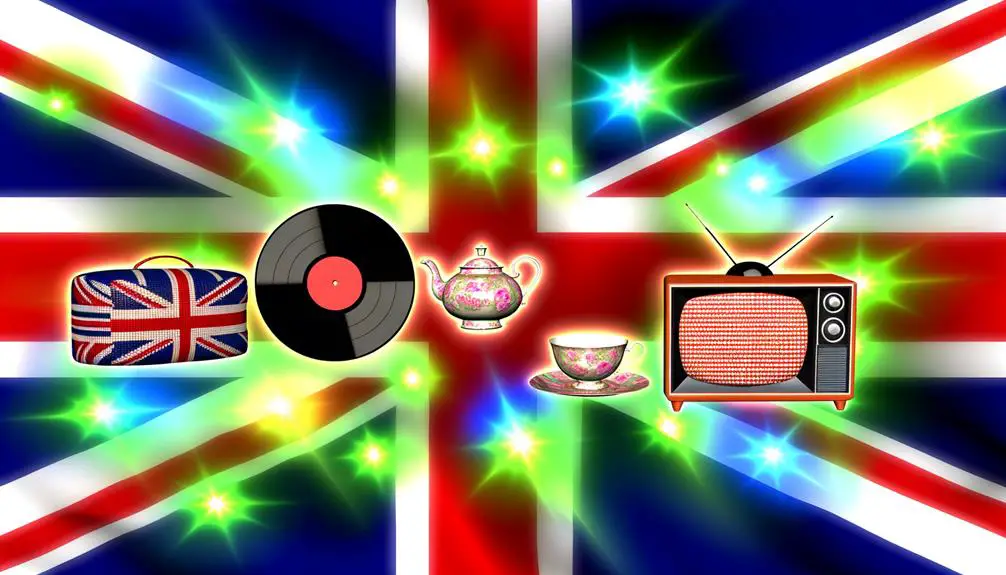
You've seen it splashed across your favorite British TV shows, echoing in the catchy choruses of UK chart-toppers, and even rolling off the tongues of celebrities with that effortless cool. It's 'brilliant' – not just a word, but a cultural stamp that Britain has pressed firmly onto the fabric of global pop culture. Let's see how this simple term became the ultimate seal of approval in the worlds of television, music, and celebrity banter.
British TV Shows Influence
British TV shows have masterfully woven the word 'brilliant' into the fabric of popular culture, making it a quintessential expression of approval among viewers. When you hear it delivered with a crisp British accent, it's not just praise—it's an accolade with style. This isn't just about the evolution of slang; it's about how British TV has exported a certain charm and wit worldwide. These shows, with their unique blend of humor, drama, and the occasional dash of the absurd, have turned 'brilliant' from a mere adjective into a cultural phenomenon. So, next time you're impressed and find yourself reaching for the right word, remember the British TV influence. 'Brilliant' isn't just a word; it's an experience, enriched by accents and the ever-evolving landscape of slang.
Music Scene Adoption
Shifting from TV screens to the vibrant beats of the music scene, 'brilliant' has struck a chord with artists and fans alike, embodying a seal of musical genius. You've likely heard it dropped in eclectic festival anecdotes or seen it splashed across album reviews, signaling something more than just good vibes. It's a stamp of approval that transcends genre influence, a universal nod to sounds that dare to dazzle.
- Genre influence: 'Brilliant' bridges beats from hip-hop to indie.
- Festival anecdotes often highlight 'brilliant' performances.
- Artists label their groundbreaking tracks as 'brilliant'.
- Fans use 'brilliant' to describe unforgettable live music experiences.
- Critics award the 'brilliant' tag to albums that reshape genres.
In the music world, 'brilliant' isn't just praise; it's the gold standard.
Celebrity Endorsements and Usage
When celebrities toss around 'brilliant' to describe everything from a fellow star's performance to a groundbreaking fashion line, it's clear this slang has infiltrated the very fabric of popular culture. You've seen it, right? From red carpet interviews to Twitter shoutouts, 'brilliant' is the go-to adjective, signaling approval that's both classy and distinctly British. But it's not just about throwing around fancy words; it's about setting trends. And with every endorsement, they're crafting our slang, one brilliant moment at a time.
| Celebrity | 'Brilliant' Usage |
|---|---|
| Actor A | Film performance |
| Singer B | New album release |
| Designer C | Latest collection |
| Chef D | Innovative dish |
| Influencer E | Social cause |
Celebrity endorsements aren't just fluff; they're shaping how we talk. From endorsement trends to celebrity missteps, the word 'brilliant' is brilliantly complex.
Comparative Slang: 'Brilliant' Vs. 'Awesome'
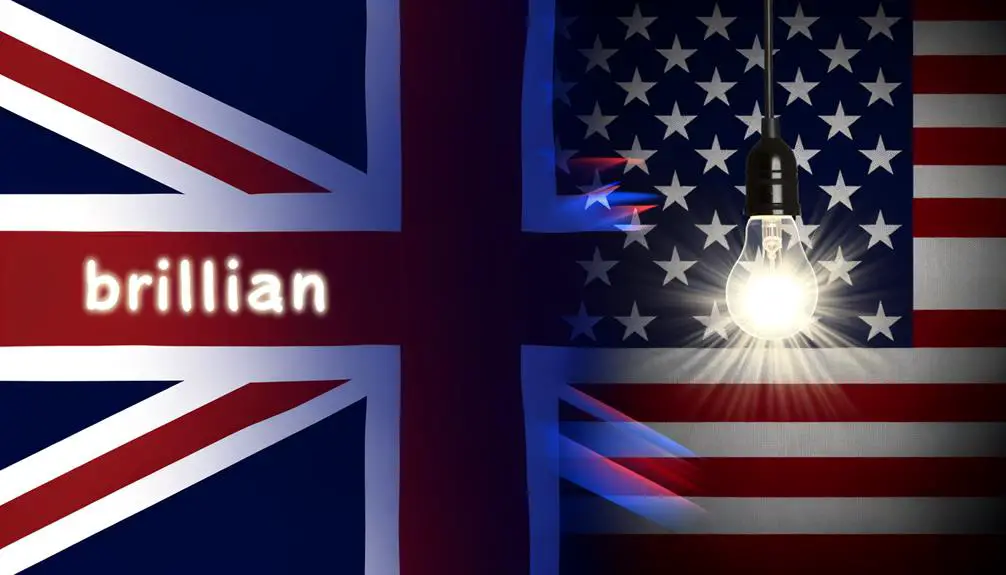
While 'brilliant' might reign supreme in British conversations, across the pond, 'awesome' has carved out its own formidable niche in American slang. Diving into the linguistic evolution of these expressions reveals a fascinating journey of cultural exchange and adaptation, with 'brilliant' and 'awesome' serving as perfect examples of American equivalents in the slang world. Both words pack a punch, but they're used in their respective playgrounds to express admiration, approval, or awe in ways that are as unique as they are similar.
- Variety is the Spice of Life: 'Brilliant' can describe both a well-executed plan and a smart individual, while 'awesome' might be used for anything from a breathtaking view to a generous act.
- Context is Key: The setting can drastically change how these words are received. In a casual setting, both are equally powerful.
- Cultural Echoes: Each word reflects its cultural origins—'brilliant' with its intellectual British flair, and 'awesome', the laid-back American cool.
- Adaptability: Both slang terms have shown incredible versatility, fitting into various contexts without losing their punch.
- Evolution: They've evolved to become more than just words; they're cultural markers, signaling belonging and understanding within their respective communities.
Regional Variations Across the UK
Fascinatingly, you'll often find that 'outstanding' takes on new shades of meaning as you hop from one UK region to another. It's a tribute to the rich tapestry of the English language across the British Isles, where dialectical differences and the evolution of slang paint a vivid picture of local identity and culture. Let's take a whimsical tour through some of these variations, shall we?
| Region | Interpretation of 'Outstanding' |
|---|---|
| London | Exceptional, the bee's knees |
| Scotland | Remarkably good, often with a hint of surprise |
| Northern Ireland | Grand, splendid beyond expectation |
| Wales | Fantastic, with a touch of Welsh pride |
| North England | Ace, or simply the best thing since sliced bread |
Each interpretation is a delightful nod to local vernacular, where 'outstanding' morphs to match the linguistic landscape. It's a remarkable example (pun absolutely intended) of how slang evolution keeps the English language as lively and dynamic as ever. So, as you traverse the UK, tune your ears to these regional nuances. They're not just words; they're a cultural journey.
Tips for Using 'Brilliant' Like a Local
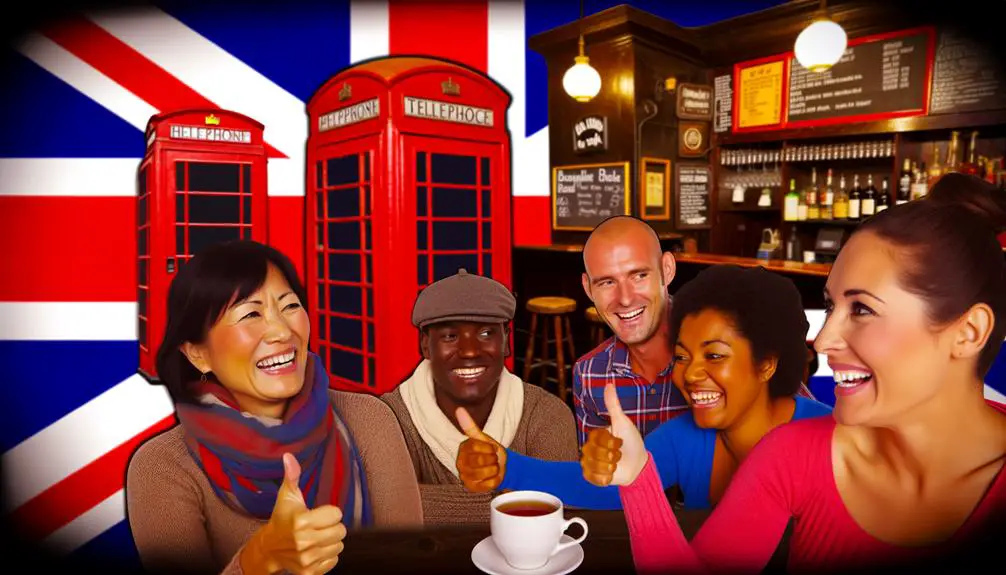
So, you're keen to sound as authentically British as a cuppa in the Queen's hand, huh? Well, grasping the nuances of 'brilliant' is your golden ticket, ensuring you're not just throwing it around like confetti at a wedding. We'll guide you through common contexts and examples, while helping you dodge those awkward misinterpretation pitfalls – because no one wants to be 'that' tourist.
Understanding 'Brilliant' Nuances
To truly get the hang of using 'brilliant' like a Brit, you'll need to grasp its subtle nuances beyond the dictionary definition. Accent impact and slang evolution play significant roles in this journey, so buckle up; it's going to be a cheeky ride.
- Accent impact: Your attempt at 'brilliant' could sound either posh or utterly misplaced depending on your accent imitation skills.
- Slang evolution: Stay updated; 'brilliant' evolves faster than British weather changes.
- Timing is everything: Dropping a 'brilliant' at the wrong moment can be more tea-cold than tea-cozy.
- Not just for successes: Used for sarcasm, a 'brilliant' can turn a mishap into a moment of humor.
- Know your audience: Gauge the room before letting your 'brilliant' fly; not everyone's ready for that level of Britishness.
Common Contexts and Examples
Exploring the social landscapes of Britain, you'll find 'brilliant' is not just a word but an expression woven into the very fabric of daily conversation. It's the linguistic evolution at its finest, where a single word captures delight, approval, or even sarcastic disbelief, all thanks to expressive intonations. Picture this: your mate's just aced a test, “That's brilliant!” echoes with genuine pride. Or, you've cooked your first roast, and it's actually edible, your family's chorus of “brilliant” is both a cheer and a sigh of relief. But here's where it gets cheeky – someone's made a right mess of it, and with a wry smile, “Brilliant, just brilliant,” slips out. It's all in the delivery, the context, and that distinctly British wit.
Avoiding Misinterpretation Pitfalls
Traversing the nuanced terrain of 'brilliant' can be a minefield for the uninitiated, but you'll soon be dodging misinterpretations like a pro with a bit of insider knowledge.
- Listen for the tone: Sarcasm can flip the meaning on its head.
- Context is king: A 'brilliant' idea isn't always genius—sometimes it's just agreeable.
- Watch the company: Language evolution means the youth might chuckle at your earnest use.
- Cultural adaptation: What's brilliant in London might be just 'good' in Leeds.
- Repeat after locals: Mimicry is the sincerest form of flattery and adaptation.
Navigating the ever-evolving landscape of British slang requires a keen ear and a willingness to embrace cultural adaptation, ensuring you're not just understood but also fitting in brilliantly.

